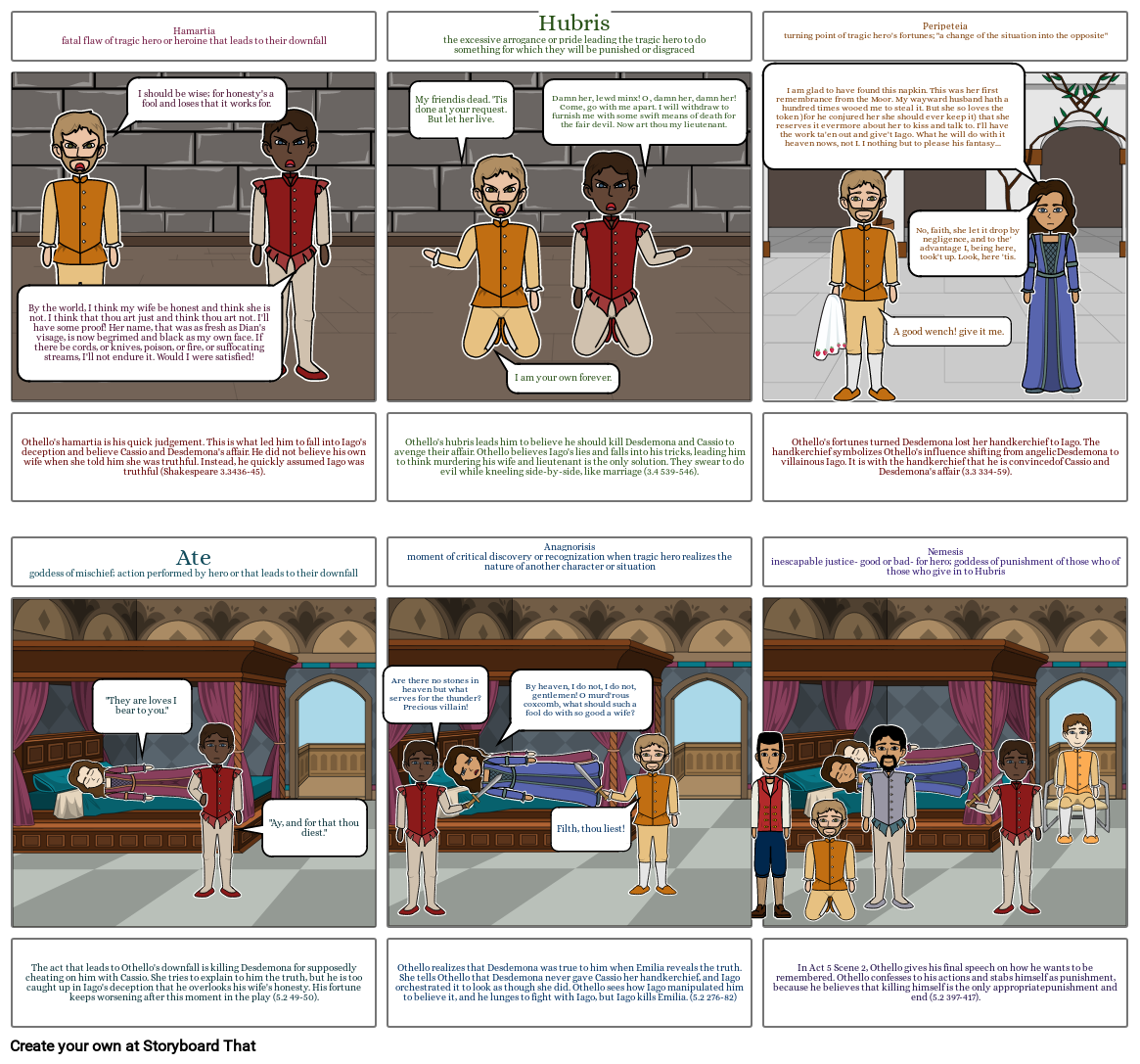GREEK TRAGEDY STORYBOARD

Siužetinės Linijos Tekstas
- Hamartiafatal flaw of tragic hero or heroine that leads to their downfall
- By the world, I think my wife be honest and think she is not. I think that thou art just and think thou art not. I'll have some proof! Her name, that was as fresh as Dian's visage, is now begrimed and black as my own face. If there be cords, or knives, poison, or fire, or suffocating streams, I'll not endure it. Would I were satisfied!
- I should be wise; for honesty's a fool and loses that it works for.
-
- My friendis dead. 'Tis done at your request. But let her live.
- Hubristhe excessive arrogance or pride leading the tragic hero to do something for which they will be punished or disgraced
- Damn her, lewd minx! O, damn her, damn her! Come, go with me apart. I will withdraw to furnish me with some swift means of death for the fair devil. Now art thou my lieutenant.
- I am glad to have found this napkin. This was her first remembrance from the Moor. My wayward husband hath a hundred times wooed me to steal it. But she so loves the token )for he conjured her she should ever keep it) that she reserves it evermore about her to kiss and talk to. I'll have the work ta'en out and give't Iago. What he will do with it heaven nows, not I. I nothing but to please his fantasy...
- Peripeteiaturning point of tragic hero's fortunes; "a change of the situation into the opposite"
- A good wench! give it me.
- No, faith, she let it drop by negligence, and to the' advantage I, being here, took't up. Look, here 'tis.
- Othello's hamartia is his quick judgement. This is what led him to fall into Iago's deception and believe Cassio and Desdemona's affair. He did not believe his own wife when she told him she was truthful. Instead, he quickly assumed Iago was truthful (Shakespeare 3.3436-45).
- Ategoddess of mischief; action performed by hero or that leads to their downfall
- "They are loves I bear to you."
- Are there no stones in heaven but what serves for the thunder?Precious villain!
- Othello's hubris leads him to believe he should kill Desdemona and Cassio to avenge their affair. Othello believes Iago's lies and falls into his tricks, leading him to think murdering his wife and lieutenant is the only solution. They swear to do evil while kneeling side-by-side, like marriage (3.4 539-546).
- Anagnorisismoment of critical discovery or recognization when tragic hero realizes the nature of another character or situation
- I am your own forever.
- By heaven, I do not, I do not, gentlemen! O murd'rous coxcomb, what should such a fool do with so good a wife?
- Othello's fortunes turned Desdemona lost her handkerchief to Iago. The handkerchief symbolizes Othello's influence shifting from angelicDesdemona to villainous Iago. It is with the handkerchief that he is convincedof Cassio and Desdemona's affair (3.3 334-59).
- Nemesisinescapable justice- good or bad- for hero; goddess of punishment of those who of those who give in to Hubris
- The act that leads to Othello's downfall is killing Desdemona for supposedly cheating on him with Cassio. She tries to explain to him the truth, but he is too caught up in Iago's deception that he overlooks his wife's honesty. His fortune keeps worsening after this moment in the play (5.2 49-50).
- "Ay, and for that thou diest."
- Othello realizes that Desdemona was true to him when Emilia reveals the truth. She tells Othello that Desdemona never gave Cassio her handkerchief, and Iago orchestrated it to look as though she did. Othello sees how Iago manipulated him to believe it, and he lunges to fight with Iago, but Iago kills Emilia. (5.2 276-82)
- Filth, thou liest!
- In Act 5 Scene 2, Othello gives his final speech on how he wants to be remembered. Othello confesses to his actions and stabs himself as punishment, because he believes that killing himself is the only appropriatepunishment and end (5.2 397-417).
Sukurta daugiau nei 30 milijonų siužetinių lentelių

